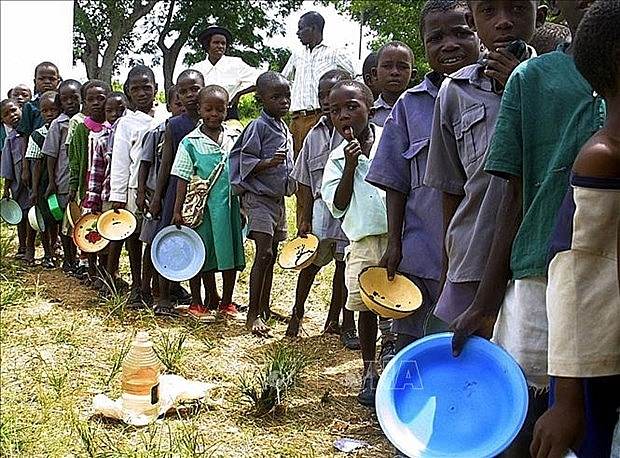Vietnam calls for settlement of vicious cycle of conflicts, food insecurity
 |
| Children line up to get food in Harare, Zimbabwe. (Photo: AFP/VNA) |
Quy made the appeal at the UNSC’s online meeting regarding the protection of civilians from conflict-induced hunger.
Apart from maintaining commitments to humanitarian aid, the UN and international community need to cooperate and support countries in post-conflict restoration, improving people’s livelihoods and maintaining food supplies, while taking comprehensive measures to build peace and ensure food security, he said.
Quy also proposed promoting women’s full participation in building peace and ensuring food security.
In his remarks, FAO Director-General Qu Dongyu cited the Global Report on Food Crises in 2020 as saying that 135 million people in 55 countries were trapped in a food crisis in 2019.
This is the highest number in the last four years. Almost 60 percent of all those people came from countries with conflict or instability, especially South Sudan, Yemen and Sahel.
Executive Director of the World Food Programme David Beasley pointed to a grim picture of 135 million people facing crisis levels of hunger or worse, coupled with an additional 130 million on the edge of starvation prompted by the coronavirus.
Miguel Vargas Maldonado, Foreign Minister of the Dominican Republic that holds the UNSC Presidency in April, suggested coordinating the UN’s pillars of peace, security, development, environment and humanitarian aid.
Other delegates shared the view that armed conflicts have resulted in stagnant food production, destroyed infrastructure, and caused homelessness, humanitarian consequences and severe starvation.
They called on all sides to observe international humanitarian law and relevant resolutions of the UNSC, and proposed the council step up efforts to prevent and address conflicts and build peace sustainably.
What the stars mean:
★ Poor ★ ★ Promising ★★★ Good ★★★★ Very good ★★★★★ Exceptional
 Tag:
Tag:
Themes: COVID-19
- 67 million children missed out on vaccines because of Covid: UNICEF
- Vietnam records 305 COVID-19 cases on October 30
- 671 new COVID-19 cases recorded on October 1
- Vietnam logs additional 2,287 COVID-19 cases on Sept. 21
- People’s support decisive to vaccination coverage expansion: official
Related Contents
Latest News
More News
- Foreign leaders extend congratulations to Party General Secretary To Lam (January 25, 2026 | 10:01)
- Russian President congratulates Vietnamese Party leader during phone talks (January 25, 2026 | 09:58)
- Worldwide congratulations underscore confidence in Vietnam’s 14th Party Congress (January 23, 2026 | 09:02)
- Political parties, organisations, int’l friends send congratulations to 14th National Party Congress (January 22, 2026 | 09:33)
- 14th National Party Congress: Japanese media highlight Vietnam’s growth targets (January 21, 2026 | 09:46)
- 14th National Party Congress: Driving force for Vietnam to continue renewal, innovation, breakthroughs (January 21, 2026 | 09:42)
- Vietnam remains spiritual support for progressive forces: Colombian party leader (January 21, 2026 | 08:00)
- Int'l media provides large coverage of 14th National Party Congress's first working day (January 20, 2026 | 09:09)
- Vietnamese firms win top honours at ASEAN Digital Awards (January 16, 2026 | 16:45)
- ASEAN Digital Ministers' Meeting opens in Hanoi (January 15, 2026 | 15:33)






















 Mobile Version
Mobile Version